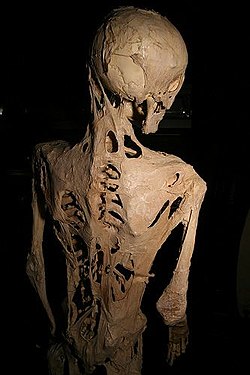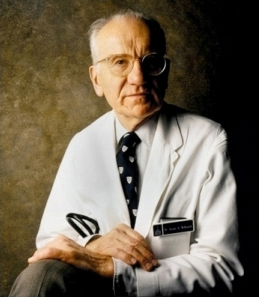Fibrodysplasia ossificans progressiva

Editor-In-Chief: Prab R Tumpati, MD
Obesity, Sleep & Internal medicine
Founder, WikiMD Wellnesspedia &
W8MD medical weight loss NYC and sleep center NYC
| Fibrodysplasia ossificans progressiva | |
|---|---|

| |
| Synonyms | Myositis ossificans progressiva, Münchmeyer disease |
| Pronounce | |
| Specialty | Medical genetics |
| Symptoms | Progressive ossification of muscles, tendons, and ligaments |
| Complications | N/A |
| Onset | Childhood |
| Duration | Lifelong |
| Types | N/A |
| Causes | Genetic mutation in the ACVR1 gene |
| Risks | |
| Diagnosis | Clinical evaluation, genetic testing |
| Differential diagnosis | |
| Prevention | None |
| Treatment | Supportive care, physical therapy |
| Medication | |
| Prognosis | Progressive disability |
| Frequency | 1 in 2 million people |
| Deaths | |
Fibrodysplasia ossificans progressiva (FOP) is a rare and disabling genetic disorder characterized by the abnormal development of bone in muscles, tendons, ligaments, and other connective tissues. This process is known as heterotopic ossification, and it leads to the progressive restriction of movement as the joints become encased in bone.
Genetics[edit]

FOP is caused by mutations in the ACVR1 gene, which encodes the activin A receptor type I, a bone morphogenetic protein (BMP) type I receptor. The most common mutation is a single nucleotide substitution, c.617G>A, resulting in the amino acid substitution R206H. This mutation leads to the constitutive activation of the BMP signaling pathway, causing inappropriate bone formation.
Pathophysiology[edit]
The BMP signaling pathway plays a crucial role in bone development and repair. In FOP, the mutation in the ACVR1 gene causes the receptor to be overly active, even in the absence of its ligand. This results in the continuous activation of downstream signaling pathways that promote the differentiation of mesenchymal stem cells into bone-forming cells, leading to heterotopic ossification.
Clinical Features[edit]
FOP is characterized by the presence of congenital malformations of the great toes, which are often short and bent. The hallmark of the disease is the episodic and progressive formation of bone in soft tissues, typically beginning in early childhood. Flare-ups can be triggered by trauma, viral infections, or spontaneously, and they lead to the formation of new bone, further restricting movement.
History[edit]

The first known description of FOP dates back to the 17th century, when French physician Gui Patin documented a case. However, it was not until the 20th century that the condition was more thoroughly studied and understood.
Research and Advances[edit]

Significant advances in the understanding of FOP have been made in recent decades, particularly through the work of researchers such as Victor McKusick, who contributed to the field of medical genetics.

Dr. Frederick S. Kaplan and his team have been instrumental in identifying the genetic mutation responsible for FOP and in advancing research into potential treatments.

Dr. Eileen Shore has also played a key role in understanding the molecular mechanisms underlying FOP and in exploring therapeutic approaches to manage the condition.
Management[edit]
Currently, there is no cure for FOP, and treatment focuses on managing symptoms and preventing flare-ups. Avoidance of trauma and unnecessary surgical procedures is crucial, as these can exacerbate the condition. Research into potential therapies, including inhibitors of the BMP pathway, is ongoing.
See also[edit]
Ad. Transform your life with W8MD's Budget GLP-1 injections from $75


W8MD offers a medical weight loss program to lose weight in Philadelphia. Our physician-supervised medical weight loss provides:
- Weight loss injections in NYC (generic and brand names):
- Zepbound / Mounjaro, Wegovy / Ozempic, Saxenda
- Most insurances accepted or discounted self-pay rates. We will obtain insurance prior authorizations if needed.
- Generic GLP1 weight loss injections from $75 for the starting dose.
- Also offer prescription weight loss medications including Phentermine, Qsymia, Diethylpropion, Contrave etc.
NYC weight loss doctor appointmentsNYC weight loss doctor appointments
Start your NYC weight loss journey today at our NYC medical weight loss and Philadelphia medical weight loss clinics.
- Call 718-946-5500 to lose weight in NYC or for medical weight loss in Philadelphia 215-676-2334.
- Tags:NYC medical weight loss, Philadelphia lose weight Zepbound NYC, Budget GLP1 weight loss injections, Wegovy Philadelphia, Wegovy NYC, Philadelphia medical weight loss, Brookly weight loss and Wegovy NYC
|
WikiMD's Wellness Encyclopedia |
| Let Food Be Thy Medicine Medicine Thy Food - Hippocrates |
Medical Disclaimer: WikiMD is not a substitute for professional medical advice. The information on WikiMD is provided as an information resource only, may be incorrect, outdated or misleading, and is not to be used or relied on for any diagnostic or treatment purposes. Please consult your health care provider before making any healthcare decisions or for guidance about a specific medical condition. WikiMD expressly disclaims responsibility, and shall have no liability, for any damages, loss, injury, or liability whatsoever suffered as a result of your reliance on the information contained in this site. By visiting this site you agree to the foregoing terms and conditions, which may from time to time be changed or supplemented by WikiMD. If you do not agree to the foregoing terms and conditions, you should not enter or use this site. See full disclaimer.
Credits:Most images are courtesy of Wikimedia commons, and templates, categories Wikipedia, licensed under CC BY SA or similar.
Translate this page: - East Asian
中文,
日本,
한국어,
South Asian
हिन्दी,
தமிழ்,
తెలుగు,
Urdu,
ಕನ್ನಡ,
Southeast Asian
Indonesian,
Vietnamese,
Thai,
မြန်မာဘာသာ,
বাংলা
European
español,
Deutsch,
français,
Greek,
português do Brasil,
polski,
română,
русский,
Nederlands,
norsk,
svenska,
suomi,
Italian
Middle Eastern & African
عربى,
Turkish,
Persian,
Hebrew,
Afrikaans,
isiZulu,
Kiswahili,
Other
Bulgarian,
Hungarian,
Czech,
Swedish,
മലയാളം,
मराठी,
ਪੰਜਾਬੀ,
ગુજરાતી,
Portuguese,
Ukrainian